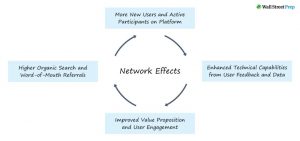 The network effect happens when the value of a good or service rises as an indirect effect of more people using it. There isn’t always an obvious change, but it is not purely coincidental that platforms that start to gain more traction also start to earn more money. A good example of this is Facebook—Facebook started to grow and evolve as more people started creating accounts and using Facebook, thus also adding more data. Facebook began earning more money as it collected valuable information about customer preferences and running ads.
The network effect happens when the value of a good or service rises as an indirect effect of more people using it. There isn’t always an obvious change, but it is not purely coincidental that platforms that start to gain more traction also start to earn more money. A good example of this is Facebook—Facebook started to grow and evolve as more people started creating accounts and using Facebook, thus also adding more data. Facebook began earning more money as it collected valuable information about customer preferences and running ads.
Cloud computing is the on-demand availability of computer system resources, especially data storage and computing power, without direct active management by the user. Cloud computing has become very popular in recent years due to the rise of technology—with so many people able to access the internet and data from their own homes and smartphones, it is easier to store all information in one central place that is conveniently accessible to those who want to find it. Unfortunately, since all the information is stored in one central place, this can bring up issues of safety and data breaches since all the information can be accessed from one location.
API stands for “Application programming interface”, and it is a software intermediary to allow two applications to communicate with each other. Building APIs onto older systems makes it possible for businesses to extract valuable existing data for new innovations. Incorporating APIs into new applications allows easier consumption and reuse across new web and mobile experiences.
Hi Sophie, thanks for your post! I liked what you mentioned about Facebook. There’s the saying that if an app is free, you’re the product, and I think a lot of times people take that to mean that an app is harvesting your data, or making money off users in terms of advertising. A lot of times this is true, but I think people miss the idea that this could also be true in the network effect. If your presence on the app is adding value, a company doesn’t need you to pay for the app. The value that you generate from being on the app is much greater than any fee that could be charged.